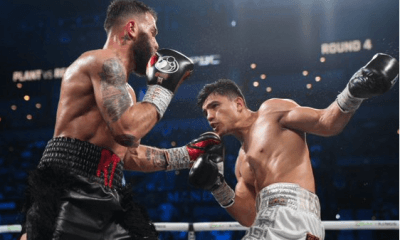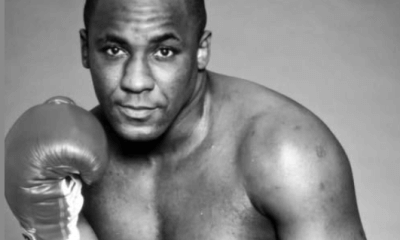Articles of 2006
De La Hoya Back Again
Since winning the WBO junior lightweight title 12 years ago, East Los Angeles boxer Oscar De La Hoya has risen to unparalleled heights on his way to gaining more than $300 million as a prizefighter.
Why is he still boxing?
“I need this fight because I want to be a champion and leave the sport on top. I have to do it, I just have to,” said De La Hoya, 33, immaculately dressed as always.
The mega millionaire prizefighter that surpassed every single boxer for money earnings in the history of the sport outside of heavyweights (but not by much), has another engagement, this time with WBC junior middleweight titleholder Ricardo “El Matador” Mayorga (28-5-1, 23 KOs) at the MGM Grand in Las Vegas on May 6.
Not Sugar Ray Leonard, not Sugar Ray Robinson, not even the great Muhammad Ali received as much of the green stuff as little ole De La Hoya, the kid with the movie star face and the darling of a million female followers.
But it didn’t begin instantly, despite winning the gold medal in 1992 during the Olympics in Barcelona, Spain.
With speedy fists, a thin black mustached De La Hoya found it difficult to win the hearts of the Southern California fight fans from 1992 until 1995. Slowly the change came even after boxing promoter extraordinaire Bob Arum of Top Rank took over the duties.
After winning the junior lightweight title from Jimmy Bredahl at the Olympic Auditorium on March 5, 1994, fans still didn’t flock to see the Golden Boy. The famous boxing arena had more than a thousand empty seats visible in the rafters where the camera couldn’t reveal.
“I remember those days,” said Joel De La Hoya, the older brother and assistant cornerman who works all of the fights. “A lot has changed since then. It seems like a different world.”
That was more like $298 million ago when Top Rank was searching for a way to showcase their local Los Angeles fighter with the super fast hands and Hollywood-like looks. The crowds stayed away. What was missing?
Although born of Mexican heritage De La Hoya was not adopted by the largely Mexican communities engulfed in Southern California. And while they had flocked to boxing matches at the Olympic Auditorium and the Inglewood Forum for decades, they just didn’t flock to see the kid who won the gold medal.
All you had to do was ask someone on the street for a reason.
“He’s too sissy,” says Danny Prado, the owner of a barbershop in East Los Angeles. “I’m a Julio Cesar Chavez fan.”
The pochos
Because De La Hoya followed Mexico’s “el gran campeon” Chavez in the boxing scene, most first and second generation Mexicans who moved to the U.S. adored J.C.C. For them, De La Hoya represented the Americanized Mexican. The “pochos.”
De La Hoya, a second generation Mexican, who speaks English and Spanish fluently, became the idol of Mexicans living in this country from third generation on. He became the hero of those who lived through the East L.A. Riots, the Zoot Suit Riots and the Red Scare of the 1930s. They appreciated the achievements of the young fresh-faced kid who attended Griffith Junior High and Garfield High School, just like them.
“A few boxers like Oscar came out of East L.A.,” said Leonard Castillon, 90, who lives in City Terrace, a neighborhood of East L.A. “There was a guy named Keeny Teran who was real good. He was a good-looking kid too.”
Teran stormed through opponents with a combination of speed, power and striking looks during the early 1950s. The Hollywood glitter crowd took a quick liking to the East L.A. kid. Most wanted to sponsor the fighter, including actor George Raft.
“He liked dope,” Castillon said, adding that Teran became addicted to heroin. “Everybody tried to help him but nothing worked.”
Teran was found in the Main Street Gym drugged up and barely conscious. His career lasted a mere four years but he was headliner at both the Olympic Auditorium and the Hollywood Legion Stadium. He quit boxing and died 40 years later in 1995.
He was pure star power.
“Ooh Keeny Teran could pack them in I tell you,” Castillon said. “Especially the women.”
Jump ahead 40 years and you have De La Hoya, whose face seemed more appropriate for film productions than facial destruction.
After defending his junior lightweight title against Giorgio Campanella and suffering a knockdown, De La Hoya moved up in weight and met Mexico’s clown prince Jorge “Maromero” Paez for the vacant WBO lightweight title at the Inglewood Forum. The contest lasted all of three minutes and 39 seconds. Paez was out cold.
Subsequent bouts against Carl Griffith, John Avila and John John Molina were a little more competitive and slowly the boxing fans became interested. Meanwhile, a kid across town from the San Fernando Valley had won the IBF lightweight title and had been clobbering guys. Three consecutive opponents were knocked out facing him.
De La Hoya and Ruelas met at Caesars Palace on May 6, 1995. Fans waved a large green, red and white Mexican flag when the San Fernando fighter entered the ring. Many fans booed when De La Hoya made his entrance but a large cross-cultural mix of fans cheered the former Olympian.
That night De La Hoya exploded on Ruelas with a lightning combination that reverberated in the air with such fury and speed it seemed to ignite a national fervor. With a single left hook the East L.A. fighter proved he was not just a pretty face, but a devastating puncher who killed with his fists as much as his face.
After collecting the IBF lightweight title, De La Hoya proceeded to win world titles in four more weight divisions including the middleweight title. There he met Philadelphia’s Bernard Hopkins who stopped him for the first time in his career. It looked like the end for the Golden Boy.
“I actually went back to the dressing room and told myself ‘why the hell am I fighting at 160?’ and right there and then I said to myself 154 and no bigger,” De La Hoya (37-4, 29 KOs) said about losing his match to Hopkins almost two years ago. “I started fighting at 130, now you’re fighting at 160. It didn’t make sense. So 154 is my perfect weight now.”
Now he faces Mayorga, the wild man of Nicaragua who never met a threat he couldn’t make.
“I’ll tear your retina from your right eye,” said Mayorga during the press conference in Beverly Hills a week ago. “I’m furious at him. He disrespected me by saying he’s fighting again in September. He won’t be able to see after he fights me.”
The threats by Mayorga seemed to fly over De La Hoya like a misguided gnat. But the mentioning of Mrs. De La Hoya seemed to redden his face.
“I’ve never been so angry at any other fighter,” De La Hoya said. “But it’s good for me. It motivates me.”
Looking around the plush hotel digs of the Regency Beverly Wilshire, De La Hoya tugs at his suit lapels and straightens his tie.
“They (opponents) see me with a suit, they see me with a tie, not looking like a fighter. I don’t talk much,” De La Hoya said. “You know they can talk a lot, yeah they can do that. It’s fine. But come May 6 they’re going to feel some pain. That’s for sure.”
-

 Featured Articles4 weeks ago
Featured Articles4 weeks agoA Night of Mismatches Turns Topsy-Turvy at Mandalay Bay; Resendiz Shocks Plant
-

 Featured Articles2 weeks ago
Featured Articles2 weeks agoAvila Perspective, Chap. 330: Matchroom in New York plus the Latest on Canelo-Crawford
-

 Featured Articles1 week ago
Featured Articles1 week agoVito Mielnicki Jr Whitewashes Kamil Gardzielik Before the Home Folks in Newark
-

 Featured Articles4 weeks ago
Featured Articles4 weeks agoRemembering the Under-Appreciated “Body Snatcher” Mike McCallum, a Consummate Pro
-

 Featured Articles4 weeks ago
Featured Articles4 weeks agoAvila Perspective, Chap 329: Pacquiao is Back, Fabio in England and More
-

 Featured Articles3 weeks ago
Featured Articles3 weeks agoOpetaia and Nakatani Crush Overmatched Foes, Capping Off a Wild Boxing Weekend
-

 Featured Articles3 weeks ago
Featured Articles3 weeks agoFabio Wardley Comes from Behind to KO Justis Huni
-

 Featured Articles2 weeks ago
Featured Articles2 weeks agoCatching Up with Clay Moyle Who Talks About His Massive Collection of Boxing Books















